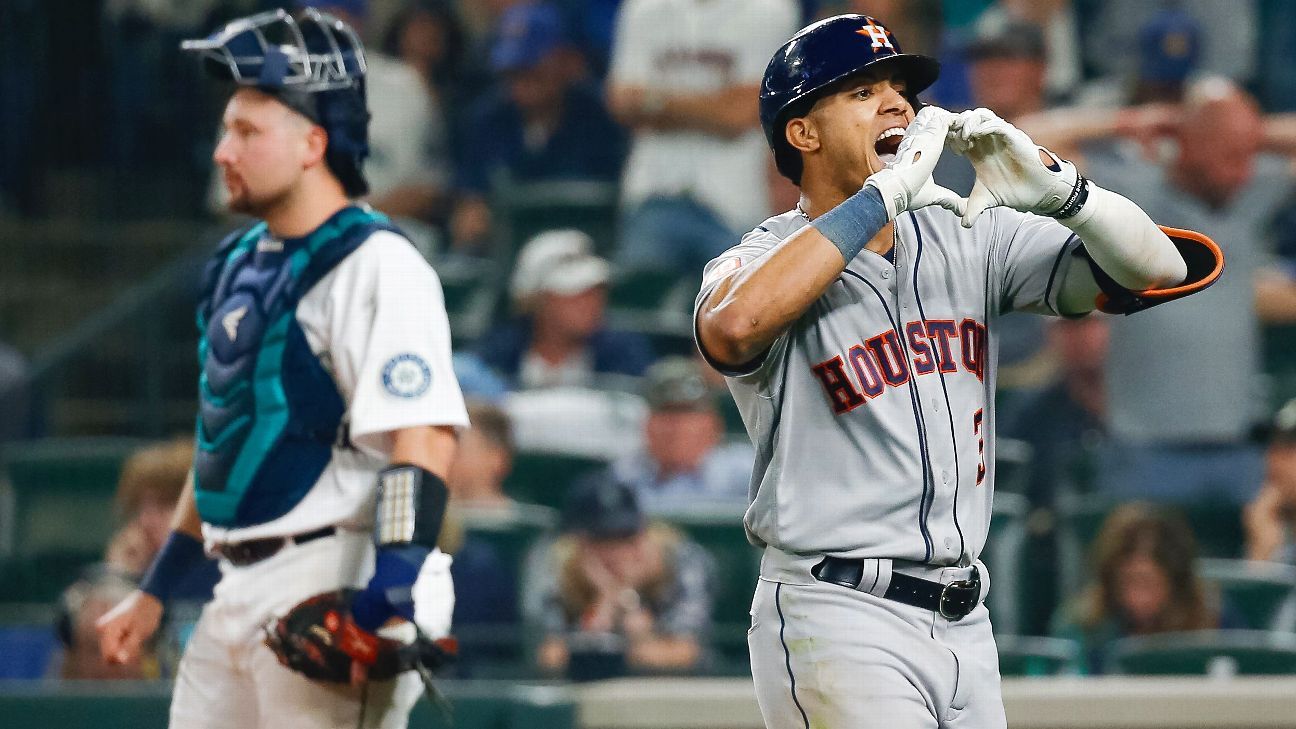Astros’ Peña caps ALDS sweep with HR in 18th

ESPN News Services
SEATTLE — Jeremy Peña homered in the 18th inning, and the Houston Astros beat the Seattle Mariners 1-0 on Saturday to advance to the American League Championship Series for the sixth straight year.
Peña, who had been 0-for-7 in the game, drove a slider from Penn Murfee deep to left-center for the rookie shortstop’s first playoff homer, proving the only run in an afternoon full of dominant pitching and empty trips to the plate. The 18 innings matched the longest game in playoff history.
It was the fourth 18th-inning home run in MLB playoff history.
Spoiling Seattle’s first home playoff appearance since 2001, Houston completed a three-game sweep of the ALDS. Next up is the New York Yankees or Cleveland Guardians in Game 1 of the ALCS on Wednesday.
The sixth consecutive ALCS for the Astros is the second-longest streak since the round was created in 1969 and the longest in American League history.
While Yordan Alvarez got the big hits in the first two games in Houston, it was Peña that set the table for Alvarez’s opportunities. As Game 3 made its way into its sixth hour, Peña delivered another painful blow to the Mariners that ended their short return to the postseason.
After 21 years, Seattle fans welcomed playoff baseball back inside T-Mobile Park. They got their money’s worth, and then some.
The Mariners, however, became the first team in MLB history to lose in 18 innings and lose on a walk-off home run in separate games of the same playoff series.
Three previous playoff games reached the 18th inning before conclusion, one involving Houston. The Astros beat the Atlanta Braves 7-6 in 18 innings in Game 4 of the 2005 NLDS on Chris Burke’s game-ending homer.
Game 2 of the 2014 NLDS between San Francisco and Washington and Game 3 of the 2018 World Series between Los Angeles and Boston also went 18 innings.
But those games had runs. This one failed to produce anything until Pena’s swing on a 3-2 pitch.
Seattle’s best scoring chance was Julio Rodriguez‘s line drive that thudded off the wall in the eighth inning. Seattle had runners in scoring position in the 13th and 17th, but couldn’t get a key two-out hit against Houston’s superb bullpen.
Unlike baseball’s regular season, there is no automatic runner when playoff games go to extra innings.
Luis Garcia worked five innings for the win. The Astros bullpen allowed five hits and struck out 15 following six innings from starter Lance McCullers Jr.
Seattle’s bullpen was nearly just as good, tallying 20 strikeouts. After rookie George Kirby threw seven innings, nine Mariners relievers combined for 11 innings of five-hit ball. Astros stars Alvarez and Jose Altuve were a combined 0-for-15 in the game, with Altuve going 0-for-16 in the series.
The game featured 498 total pitches thrown by 18 pitchers.
The teams combined to strike out 42 times, topping the postseason record of 39 set by the Guardians and Rays last week in their AL wild-card matchup that was scoreless for 15 innings before Oscar Gonzalez‘s home run sent Cleveland to the ALDS.
Altuve joined Xander Bogaerts in Game 3 of 2018 World Series versus the Dodgers as only players to go 0 for 8 or worse in a postseason game. But Houston’s other pieces came through, none bigger than its young shortstop who took on a prominent role after Carlos Correa departed in free agency.
Peña’s homer was his only hit in eight at-bats. But it was his contributions in the first two games that helped Houston travel to Seattle with a 2-0 lead in the series.
For Mariners fans, watching the drama play out was an agonizing swing of emotions and nerves for the better part of the 6 hours and 22 minutes.
Lines snaked outside the entrance hours before first pitch. Half the stadium appeared filled 90 minutes before Seattle took the field and all seats were occupied when Felix Hernandez walked out from center field to throw out a ceremonial first pitch to a deafening ovation.
The energy and noise that accompanied two decades of anticipation was pure exhilaration at the start, but turned more and more nervous the longer zeros stayed on the scoreboard. By the time the 14th-inning stretch was celebrated nearing the five-hour mark, those fans were on the verge of exhaustion and ready for finality.
It didn’t come until four innings later and was a disappointing conclusion after two decades of waiting.
The Associated Press and ESPN Stats & Information contributed to this report.